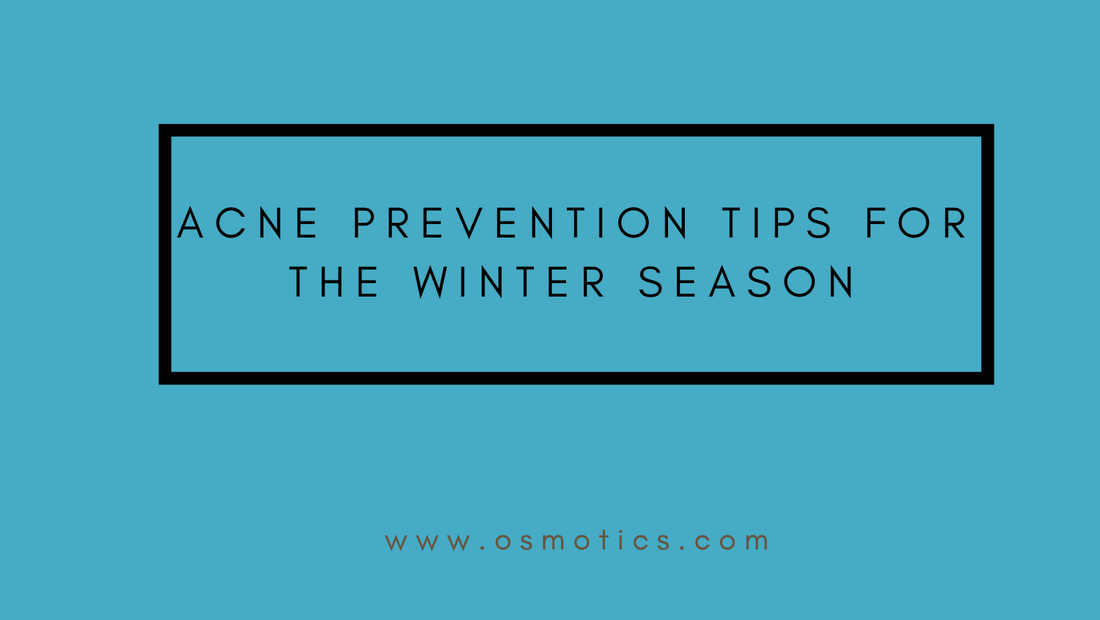
Acne prevention tips for the winter season
Share
The skin might suffer in the winter. Wind, dry indoor air, and cold weather can all dehydrate your skin. You can create painful dryness, itching, flaking, and peeling by using drying acne-fighting treatments and drugs.
Winter implies cooler temperatures, but it also means a change in skincare routine. As the humidity and the air change during winter, it makes the skin drier, scaly, and itchy. As a result, we must exercise extreme caution when it comes to our skin. Osmotics Skincare products also can assist you in reducing skincare acne.
But in the winter, acne-prone skin often reacts with additional outbreaks. As skin dries out, the body produces more oil to maintain skin balance, which leads to blockage and new breakouts.
Related Article : Tips to Prevent Dry Winter Skin
What causes acne in winter?
Despite having clear skin the rest of the year, there are a number of reasons why you might only experience acne in the winter.
less UV exposition
Lack of sunlight is a big contributor. The predisposition to break out could possibly be affected by less UV in the winter. Winter acne often develops from different sources than summer acne, which can sometimes be brought on by perspiration and dirt.
The air is cold and dry
Dry skin is a typical cause of winter acne. Winters, particularly in non-coastal states, can be extremely dry. When your skin is not moisturized and cared for, you are vulnerable to bacterial infection through skin cracks. Furthermore, to compensate for dryness, the skin may overproduce natural oils, which can lead to acne breakouts.
Triggers discovered indoors
Take stock of your home since comfy winter routines can wreak havoc on your skin. Because we spend more time indoors throughout the winter, goods like pillows and sheets may not be cleaned as frequently as they should be. Maintain your cleaning regimen even if you don't feel like you're sweating as much at night as you may in the summer.
Dietary modifications
Your vacation plans may potentially aggravate skin irritation and acne. Other factors that contribute to winter acne include the holiday season. Puopolo. Excessive sugar consumption is a direct cause of acne in many people, and the holiday season brings a lot of sweets.Other dietary factors differ from person to person and may include dairy and simple carbs. In other words, all of those cheese platters aren't good for your skin.
Winter acne, thankfully, is both treatable and preventable. For example, using over-the-counter acne remedies such as clear gels, anti-acne soaps, and acne facewash can help you achieve flawless and immaculate skin. However, because prevention is better than cure, you should consider following the advice below to keep your skin healthy and acne breakouts at bay.
Cleanse your face
Keeping your skin clean is critical during the winter. The air is full of loose dust and dirt particles that easily clog pores and cause acne. As a result, it is critical to wipe your face whenever feasible. Before you go to bed, use a deep-nourishing cleanser. During the colder months, use a moisturizing cleanser and lotion. They not only cleanse the face nicely, but they also nourish it.
Moisturizing is important
Your skin becomes dehydrated as a result of dry air because the cold air takes moisture from your skin, causing the outer layer of your skin to split and dry out. Whether you have oily, combination, normal, or sensitive skin, it is best to use a nourishing lotion or cream during this season. Those with extremely sensitive skin should use a moisturizing gel or lotion rather than a heavy cream.
Healthy skin requires proper nutrition
If you want to show off beautiful and lovely skin this season, feeding your skin is essential. Using a fruit pack is the most effective way to care for your skin. You could, for example, utilize a fruit pack comprised of ripe papayas, strawberries, and ripe mangoes.
In the winter, use gentle, pH-balanced cleansers
Reduce the use of harsh cleaners and soaps in the winter. Use gentle cleaners with a pH balance. Limit the use of salicylic acid cleansers to alternate days rather than every day.
Cut back on alcoholic beverages
Astringents and toners are naturally drying. During the winter, avoid using any irritating products that contain alcohol or have a strong odor. Otherwise, the skin will chafe, and acne breakouts will worsen.
Exfoliators should not be used excessively
Avoid using exfoliating products too frequently during the winter. Once a week, exfoliate your face. Scrubbing too hard may dry out your skin and lead to additional breakouts.
Morning Fresh air is beneficial
People prefer to keep their windows and doors closed due to the chill outside. However, make sure that you thoroughly air your room so that the dry air escapes and is replaced with fresh air. Breathing in fresh air first thing in the morning will revitalize your skin and help keep winter acne at bay.
Daily Physical Activity
During the winter, your training may take a back seat, but try not to cheat. Exercising every day will not only keep your skin shining and clean, but it will also keep you warm and energetic.
Things to keep in mind: Small changes can have a big effect. Do not take extended hot showers; instead, use lukewarm water. Use non-greasy cosmetics and skin care products at all costs. Strong perfumes or items with strong scents should be avoided since they can cause skin irritation.
